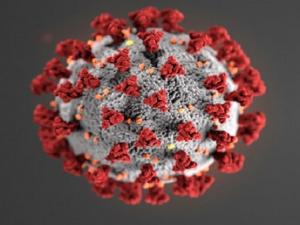
By Q Radio News & PA
There have been 763 new Covid-19 cases in Northern Ireland in the last 24-hour reporting period, the Department of Health has announced, bringing the total to 23,878.
This includes 6,394 new positive cases notified in the last seven days.
There are 201 patients with Covid-19 being treated in hospital, with 24 in intensive care.
There were four deaths reported on Thursday, taking the toll recorded by the Department of Health to 606.
It comes as tougher coronavirus restrictions are coming into force.
Here, the PA news agency looks at how restrictions differ across the UK.
– Northern Ireland
Tighter restrictions for Northern Ireland have been announced by Stormont First Minister Arlene Foster, with most measures coming into force on Friday.
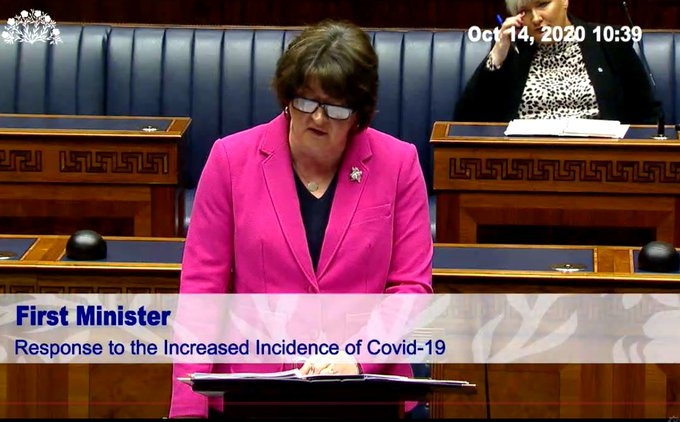
Pubs and restaurants will close for four weeks, with the exception of takeaways and deliveries, while schools will close on Monday for two weeks – one of which will cover the half-term Halloween break.
Under the new restrictions, retail outlets will remain open, as will gyms for individual training.
Churches will also remain open and it is understood a 25-person limit will be placed on funerals and weddings, but wedding receptions are prohibited.
People should work from home unless unable to do so, and are urged not to take unnecessary journeys.
– England
A new three-tier system of coronavirus restrictions began in England on Wednesday.
Nationwide restrictions apply in Tier 1, which mean people can meet in a group of up to six people from multiple households either indoors or outdoors. Unlike in Scotland and Wales, the six includes children.
Pubs, bars and restaurants must close at 10pm and face coverings must be worn while shopping, on public transport and in other indoor areas.
Under the Tier 2 restrictions, people cannot meet with anyone they do not live with indoors unless they are part of a support bubble. The rule of six applies for socialising outside, and pubs, bars and restaurants have a 10pm curfew.
The highest level of restrictions means people cannot socialise with anyone outside their household in any indoor and many outdoor settings. Pubs and bars will be forced to close unless they are operating as a restaurant.
Weddings and funerals will be allowed to take place with restrictions on the number of guests.
Liverpool City Region, comprising 1.6 million people, remains the only area currently in Tier 3.
A further 26.7 million people – including those in London – will now be covered by the Tier 2 restrictions.
– Scotland
First Minister Nicola Sturgeon said England’s tiered alert system would “give an idea” of a similar scheme to be proposed in Scotland.
It will be discussed by MSPs after the October recess and could come into effect when stricter measures are due to be eased on October 25.
Pubs, bars, restaurants and cafes outside central Scotland can only conduct indoor business between 6am and 6pm and not serve alcohol, although alcoholic drinks can be served until 10pm in outdoor areas.
But pubs and licensed restaurants in five health board areas – Greater Glasgow and Clyde, Lanarkshire, Ayrshire and Arran, Lothian, and Forth Valley – have been forced to close for all but takeaway service until October 26.
Snooker and pool halls, indoor bowling, casinos and bingo halls have also been made to close and no outdoor live events are allowed in these five areas.
In addition, shops have been asked to return to two metres of physical distancing and to reintroduce measures from earlier in the pandemic such as one-way systems.
In terms of seeing friends and family, people cannot meet others from another household unless they are part of an “extended household”, available to people who live alone or only with children under 18.
People can meet outdoors in groups of up to six, not including children under 12, from no more than two households, and a maximum of six people from two households can meet in public indoor spaces such as cafes, pubs and restaurants.
On Wednesday, Ms Sturgeon advised Scots against travelling to high-risk areas of England as she singled out Blackpool as “associated with a large and growing number of Covid cases in Scotland”.
– Wales
There are currently tighter restrictions in 17 areas of Wales, including Cardiff, Swansea and parts of North Wales, affecting more than 2.3 million people.
These prohibit people from entering or leaving an area without a reasonable excuse such as work or education.
Under the more general lockdown rules in Wales, licensed premises have to stop selling alcohol at 10pm, face coverings are mandatory in indoor public spaces and public transport, and people cannot gather in groups of more than 30 outdoors.
The rules also say people are not allowed to meet indoors with people they do not live with, unless they have formed an extended household.
People in Wales can meet indoors in a group of up to six people, with children under 11 not included in the number.
The country’s health minister Vaughan Gething has also said Wales could be placed under a new national lockdown in order to halt a sharp rise in coronavirus cases.
Meanwhile, First Minister Mark Drakeford said Wales will ban entry to people from areas of the UK with high levels of coronavirus by Friday if Boris Johnson fails to impose UK-wide travel restrictions.


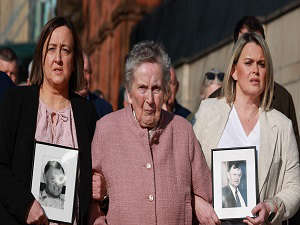 O’Neill writes to PM urging public inquiry into Sean Brown murder
O’Neill writes to PM urging public inquiry into Sean Brown murder
 Campaign to increase cancer awareness through pharmacies rolled out
Campaign to increase cancer awareness through pharmacies rolled out
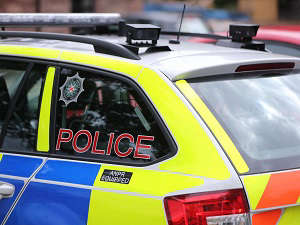 Concern over PSNI vehicles fleet, with 20% off road at worst point in 2023
Concern over PSNI vehicles fleet, with 20% off road at worst point in 2023
 Man released by police after Newry stabbing incident
Man released by police after Newry stabbing incident
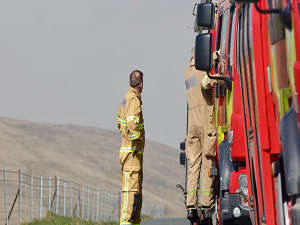 Firefighters tackle almost 150 wildfires across three days in Northern Ireland
Firefighters tackle almost 150 wildfires across three days in Northern Ireland